Berkeley’s diversity, equity and inclusion vision statement
Our vision has been developed to give us a clear and guiding ambition for our firm. Because achieving it will help Berkeley be the best it can be… in working with our clients, in ensuring our people flourish, in running our business, and in making a positive contribution to our communities.
We want...
...To be recognised by ourselves and those around us as a diverse and inclusive company that attracts, retains and develops diverse talent, where differences are harnessed, opportunity is equitable and where people feel safe to be their whole self.
‘Those around us’ includes our clients, our prospective recruits, our suppliers, our professional network, as well as our families and friends.
We aim to foster a warm, open culture of belonging that enables our people to fulfil their potential, no matter their background, ethnicity, sex, gender, sexuality, disability or working style.”
Richard Bryant, Partner and DE&I Lead
Our goals
We have developed six goals to achieve each aspect of our Vision statement.
Goal 1
Foster an increasingly inclusive workplace. Where culture and ways of working ensure everyone is engaged and able to thrive. And where people feel open and confident discussing DE&I with anyone, at any time.
Goal 2
Increase diversity of our consultant group and business services group to fully represent the diversity in our recruitment pool.
Goal 3
Increase diversity of the intake of new partners to fully represent the diversity in our consultant group.
Goal 4
Be recognised as a company with diversity, equity and inclusion as a strategic priority and core value.
Goal 5
Use our professional skills to make a positive contribution towards diversity, equity and inclusion in the communities around us.
Goal 6
Continuously evolve and experiment with our Berkeley DE&I approach, by learning from the broader DE&I environment around us.
Our diversity, equity and inclusion in focus
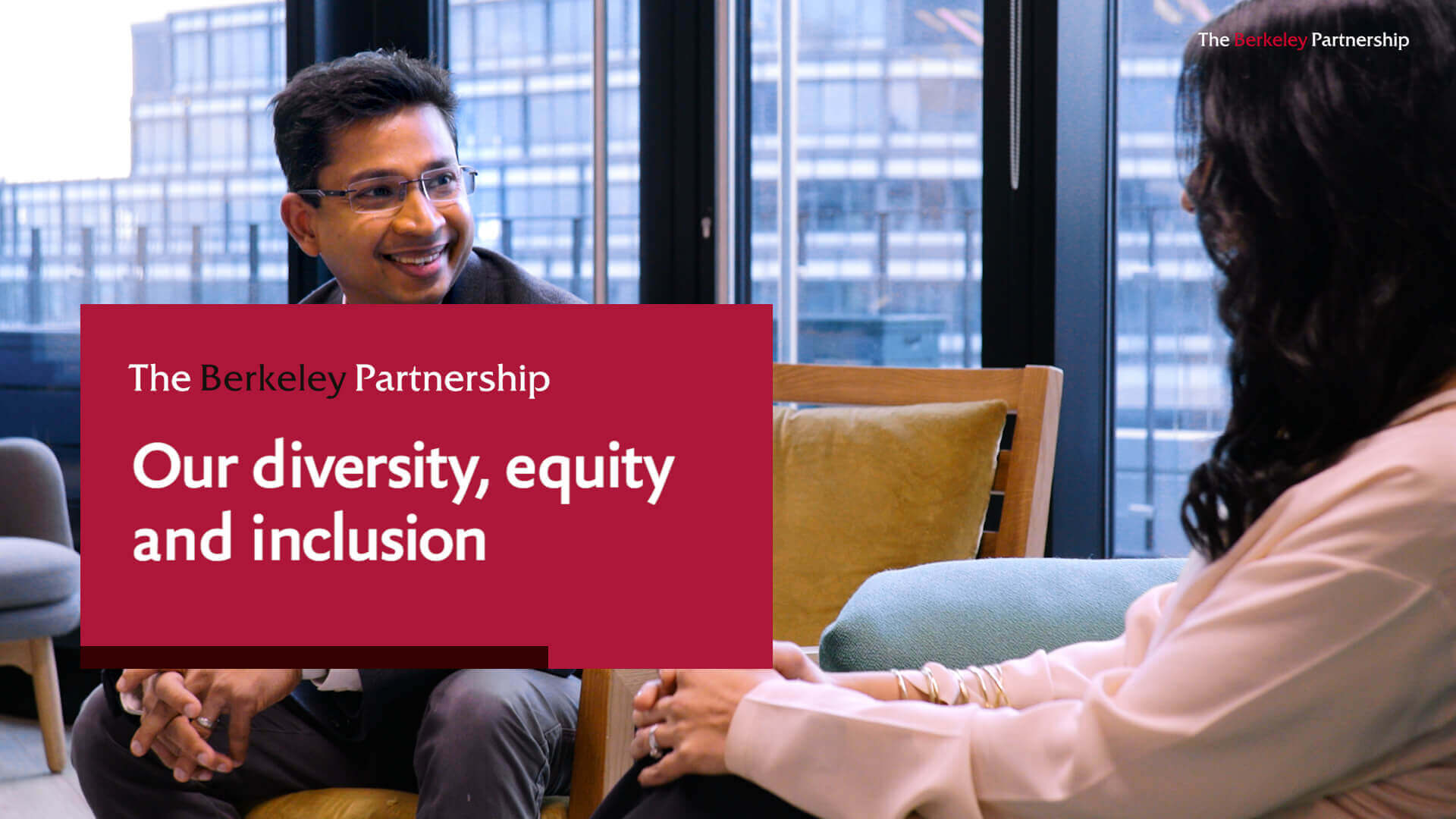
View Transcript
Sameera Simjee:
Hi, I'm Sameera and this is Will. We are two of the partners at The Berkeley Partnership. Berkeley is a consultancy which specialises in transformation and strategy, and we're joined today by Dan from Vercida.
Dan Robertson:
Hi, good to see you both again. You know, we at Vercida have been working with you for a while now on your Diversity Equity and Inclusion strategy. Talk to us about your ambition: how did you get started?
Sameera Simjee:
The big ambition here, Dan, for us as an organisation is to be recognised as a firm which attracts, develops and retains diverse talent. And with that, diversity is really harnessed and valued, that's important to us.
Dan Robertson:
Right and I know you've got a great roadmap and Will, you've got your diversity, equity and inclusion strategy and underpinning the strategy you've got these six strategic goals.
Will Rivers:
One of those goals is focused on continuing to increase the diversity of talent in our consulting group and our business services group. So, it really represents the recruitment pool. A follow-on goal from that is going to ensure that diverse talent progresses in the firm and into the partner group. And if we've got this diverse team, we know we must continue to foster an inclusive workplace. To us, that means ways of working, culture, where people can engage, thrive, opportunities are equitable, and everyone can just bring their whole self to work.
Sameera Simjee:
That firm engagement is so important. One of the things that we've done is established a DE&I working group.
Mike Abbott:
So, we meet fortnightly to hold ourselves to account against the strategic objectives and the actions that we set out in the DE&I strategy last year.
Dave Edwards:
So we've been going through a journey to gather information on people, both in terms of how they feel within Berkeley and in terms of their views on our DE&I agenda, their views on whether they feel included, whether they, you know, what they want to see more of so that we just have a much better understanding of what’s working for us, and where we still have to focus and improve upon.
Mike Abbott:
We also talk about hot topics and are constantly looking for external events that are DE&I related that we might have a point of view on or that we can take action to support.
Will Rivers:
So, we have a focused DE&I leadership role in our group, I'm currently fulfilling that role. And the purpose of that role is quite simple. It is to own the DE&I strategy on behalf of the rest of the team, and to effectively hold us all to account to make sure we make progress.
Kali Crow:
Having a dedicated DE&I leader has really made a difference. It's moved the conversation on so that it is much broader and has much more momentum, energy and focus, which has really enabled us to push things forward.
Dan Robertson:
Talk to us about how you started and why did you start? What was the driver for you?
Sameera Simjee:
We started because ultimately focusing in on this space is just the right thing to do. It's right from a wider society perspective, and it's right for our people and our people are front and centre of everything that we do in our strategy. If I reflect on where we are, our consulting group and our business services team are more diverse than they have been. We're very aware that we have a gap between the diversity of our wider firm and the diversity of our leadership team and that's something that we're absolutely committed in leading into. Our business model is a very organic one. We make partners from within the firm and that is a very deliberate strategy. We do that to really maximise our consultants' opportunities for career development. But on the flip side, that does mean it will take us time to change. But we absolutely understand the benefit and the value of having a more diverse team and a leadership team who reflects the wider group. So, I, Will and the wider leadership team are absolutely committed to making that change.
Dan Robertson:
I think that's a big challenge we see with a lot of professional services firms around holding on to diverse talent then moving on them onto partnership.
Anne-Lise Antolinos:
I've been exposed to prejudice based on my gender and being a mother, in the past 10 years. So, I think it's important that we change the game and I know it's changing but I want to be part of that change. I also have two children with special needs and for me, I'm a bit worried about their future. So, I really want to make sure that there's a place for people with special needs as well, not just about changing gender and colour.
Sameera Simjee:
Can you tell us a little bit about the challenges and maybe some of the trends in DE&I moment?
Dan Robertson:
We see lots of trends, particularly from professional services and beyond. I mean, one of the big things is around data. So really getting a handle on how well you are doing around the diversity aspect. How well are you doing around the inclusion aspect? The other trends that we see are around making sure that you have a strategy which responds to talent. But I think the final one is around clients, and I hear a lot from our clients around the pressure to have diversity equity inclusion central to what they do. I'm curious about your clients, is it on their radar how'd you have conversations with them, etc?
Sameera Simjee:
They absolutely see the benefit of working with diverse teams. And so, reflecting on Berkeley's strategy in this space. We want to foster that inclusion and the diversity of thought, the diversity of approach in our teams, because we know that that brings richness and depth to our work and the way in which we work with our clients. That's important to us. But also, it's been a learning process as well. We've learned a lot about our own approach from the conversations that we're having with our clients. At the end of the day, we are all about our people. That is our core business. So really focused on goals and focusing on the measurements is how we're going to move ourselves forward.
Dan Robertson:
Brilliant, thank you.
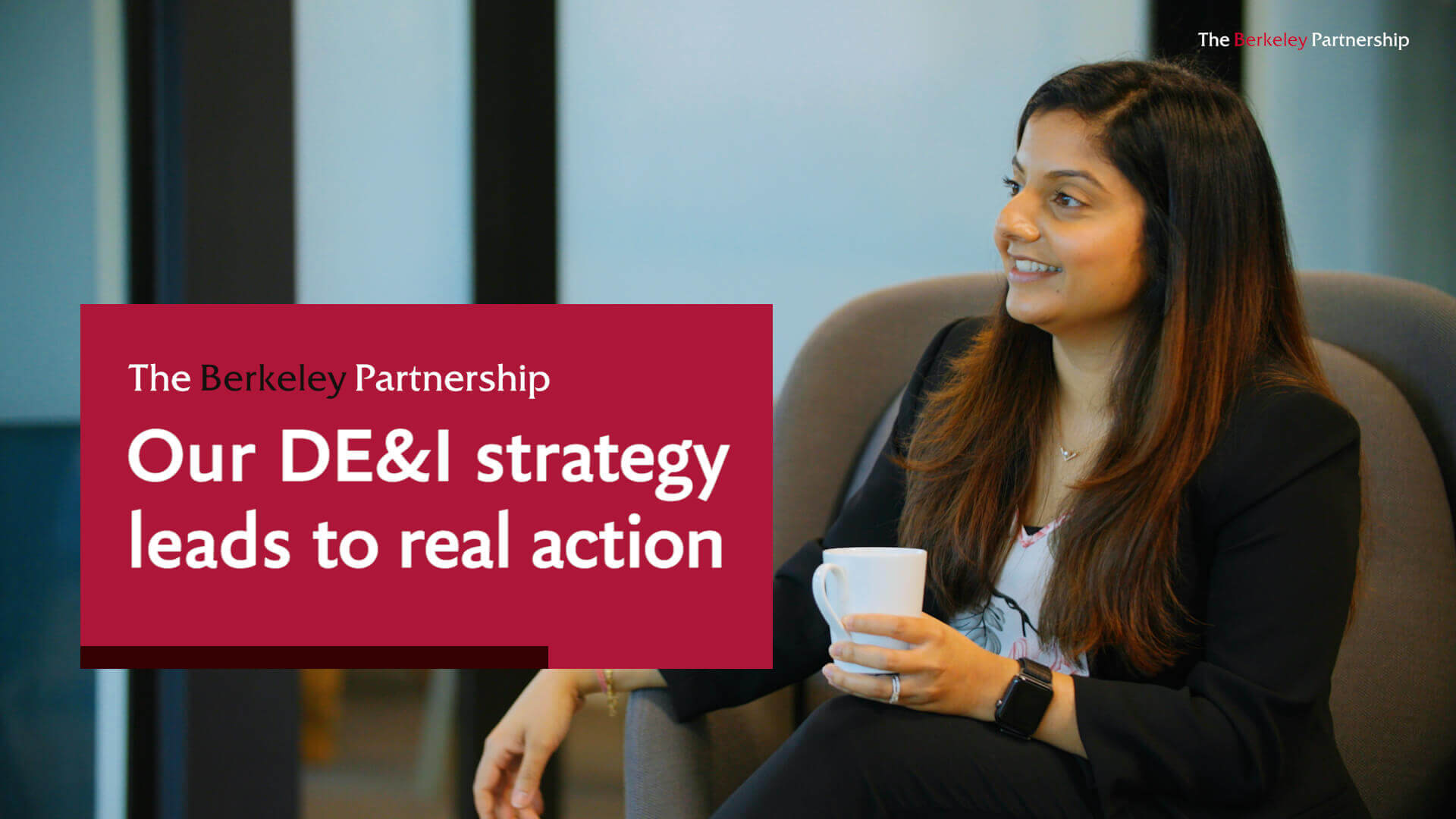
View Transcript
Sameera Simjee:
Hi, I'm Sameera and this is Will. We're two of the partners at The Berkeley Partnership, and we're joined by Dan from Vercida.
Dan Robertson:
Hi, good to see you both. You know that at Vercida when we are working with our global clients, particularly when we are developing diversity equity inclusion strategies. The first thing that we always talk to them about is leadership. I suppose we've got to engage everyone else beyond the partnership. So, what else have you been doing beyond that level of engagement?
Will Rivers:
We sort of built into the fabric of the firm, just a regular heartbeat of talking about DE&I. We do that we have Slack channels. We have our monthly meetings; we have DGs (discussion groups) on various topics. And we just keep the conversation going recognising events and dates, and we found that it's been great to raise awareness and educate each other.
Sameera Simjee:
We're also developing a network of advocates as well. And again, the purpose of that group is to really support everyone across the firm, so they feel comfortable in playing their individual parts in this journey.
Dave Edwards:
I think the thing that we've done so far that's sort of had both the biggest impact and that I'm most proud of is getting people to take personal accountability for our DE&I agenda. And that's happened, because we've had the strategy, we've launched the strategy and we've consulted people on the strategy. It happened because we're more equipped and able to talk about issues. We can spot and talk about where things are and aren't working. And more than ever, it just feels like people have got a real stake in what we're trying to achieve. They're asking how can I help more? What do you need me to do? And I think that it's not to say no one's never done it but it's something that everyone wants to know now. I think that's a real sort of key turning point for Berkeley and our DE&I agenda.
Dan Robertson:
Some great stuff there about the structure and building capacity of all colleagues to engage in this topic. What else have you been doing, just give me a sense of other activities?
Sameera Simjee:
This is an area that Vercida have really helped us with developing our conscious inclusion training, which again is open to everyone across the firm, and is now a core part of our curriculum in this space. And that has really been to bring everyone up to a level set in terms of being aware of some of these rich DE&I topics.
Will Rivers:
We also have inclusive leadership education for us as a partner group, but we do that across the firm because our consultants and business services, we have leaders everywhere. So, we built out that training curriculum. We have been reviewing our recruitment approaches and our career progression at Berkeley approaches to make sure that they are free from unconscious bias. Those opportunities are equal or equitable. And we've done that, and we will do that periodically. We spent quite a lot of time at the firm talking about partner potential. So, we put in place the opportunity for real clear explanation of our partner making process and what how we assess partner potential and the reason we've been doing that is to signal to all our talents that they could become a partner even if they can't see themselves in the partner group today.
Sameera Simjee:
It's really important.
Dan Robertson:
I’m curious about how you track progress but also what sorts of measurements you’ve put into place to know whether you're winning or not.
Will Rivers:
With Vercida’s guidance, we do track progress. We know that data is important for us to know that we're progressing to our ambition and the goals that we set ourselves. There are two types of data that we track. First of all, data about diversity, makeup of consultants, makeup of Business Services group and makeup of our partner group and all aspects of diversity. So we capture data about that, and we monitor the trend. Then the second aspect is more about inclusion. And of course, that's more sentiment based. So, we do and will continue to do, periodically, a sentiment survey as a whole firm. It's a set of questions that enable us to gauge how people feel about our progress, how people feel about the journey that we're doing. And those two data points are massively important for us to know that we're going in the right direction.
Kali Crow:
We've been constantly focusing on all elements of our development process to ensure that they are equitable for everybody, providing a range of different options and learning when necessary.
Dave Edwards:
Wherever there's a challenge. It's about ‘what can we do to fix this? How do we fix it faster? And where do we need to look next?’
Dan Robertson:
Will, we've talked quite a lot about what you've been doing internally. Let's flip it over and talk about externally What have you been doing in that space?
Will Rivers:
Well, as we build our understanding, and as we educate ourselves, we are finding our voice and that means that we're able to communicate more externally to and that's important because we want people to know what Berkeley stands for and our people stand for
Dan Robertson:
Great and Sameera to you, we know that professional service companies use the skills of their talent to promote diversity and equity inclusion in the community. Just give us a sense of again, of what Berkeley is doing in that space.
Sameera Simjee:
We've been using our professional skills in both London and New York to support some amazing not for profit initiatives. So, we're working to tackle inequality in their communities. We have got such a talented pool of individuals at Berkeley so it's great that we can really harness those professional skills to contribute in such a positive way to these organisations. And really, it's a win-win because it's so rich and rewarding for our people as well.
Jenna Goldstein:
So, we've been able to extend what we do here as part of our positive social action and provide some charity work for a young person's organisation. Now typically here at Berkeley we do a lot of pro-bono work helping charities and organisations with an operating model or their strategy which is something that we specialise in. We wanted to be a bit more diverse and inclusive for our firm and make sure that everybody can participate and give back to the local community. So, we've had some sessions with this charity, providing some mock interview experience for the young people going into the world of work.
Sandy Kyin:
I wanted to get involved with the Robin Hood programme because I felt like it is important to give back to the community. They do that through an executive coaching programme, where they provide coaches or consultants that they partner with as executive coaches to support their non-profit leaders.
Will Rivers:
So we know we can make a real difference at Berkeley internally, yes, but also externally through the things that we say and the things that we communicate, but the things that we also do like Sam described earlier.
Dan Robertson:
Great talking to you, as always.
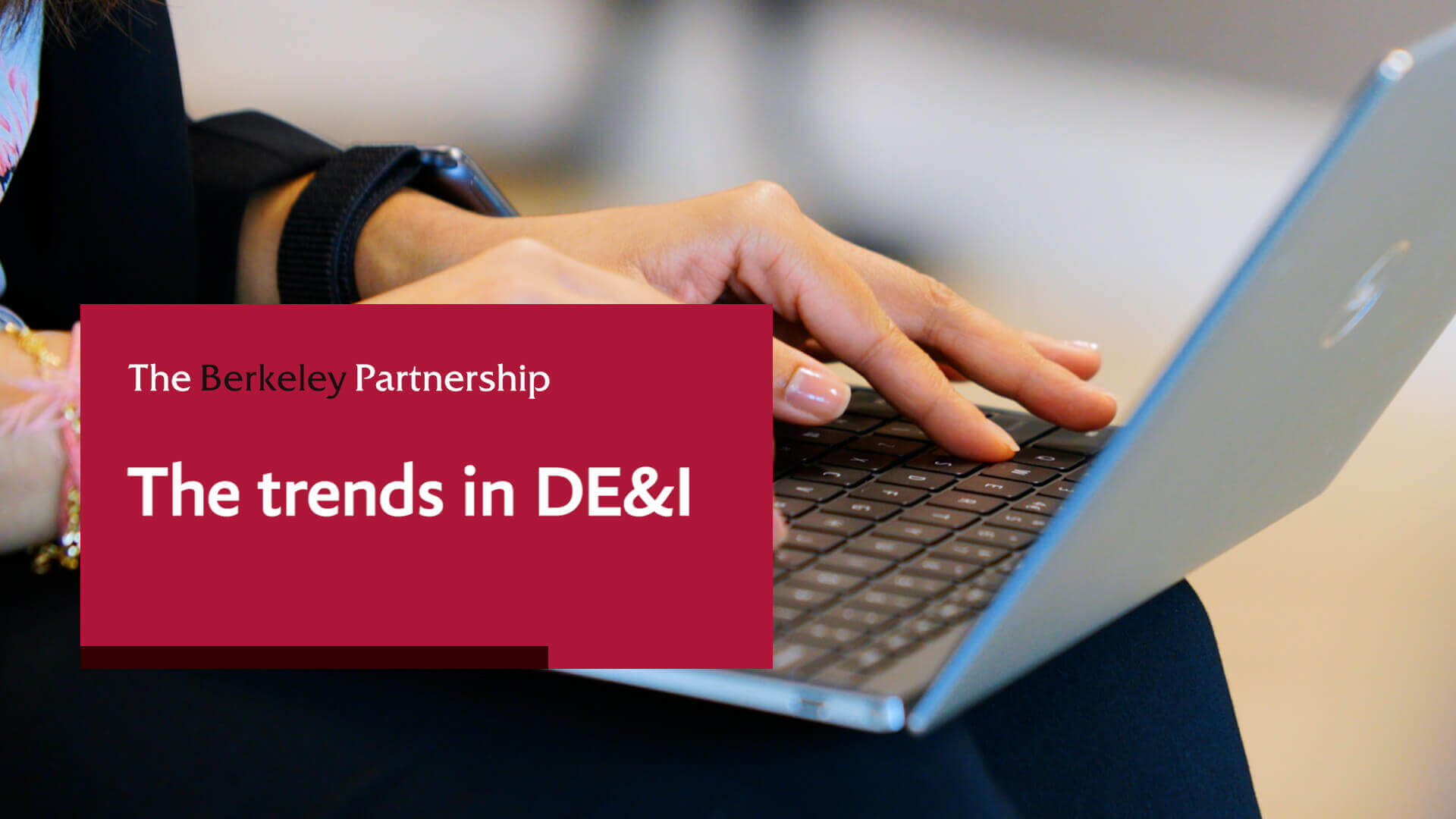
View Transcript
Sameera Simjee:
Hi, I'm Sameera and this is Will. We're two of the partners at The Berkeley Partnership. And we're joined by Dan from the Vercida.
Dan Robertson:
Hi, good to see you again Sam and good to see you Will.
Sameera Simjee:
We've really appreciated the expertise that you've brought to this space. Can you tell us a little bit about the challenges and maybe some of the trends in DE&I moment?
Dan Robertson:
So, one of the biggest trends that I see is a real focus on this idea of equity. We've historically talked about diversity and what that means is really a conversation about representation. How do we get diverse talent in organisations and how do we move it up?
I think now the shift is about saying when we have diverse talent in how we look after them, how do we make sure that we are making decisions based on those principles of fairness, mitigating bias. So, a real focus on equity is a big shift in that focus on belonging. So that's one of the big trends I see.
Then I think aligned to that is that trend on is kind of connected to talent, but it's more about an expectation from diverse talent. So, you know, people talk about employee activism, and we see lots of employees out there that are kind of demanding from their employers, a roadmap or a direction of travel on diversity, equity inclusion. So those two things I think are quite interesting, I think for all employers, those will be ramped up.
Richard Pawson:
Berkeley has got a strong commitments DE&I. We've invested loads in it. We communicate. We’re proud of it as a firm. We talk about it. It's starting to run through everything that we do. Management consultancy does face a real challenge in this area. It's not going to respond to the issues that have been highlighted by slowly evolving and trying to maintain and keep the previous structure. It is a different approach that's needed, and that's the direction we're setting out on.
Dan Robertson:
I think the other thing which I've been reflecting on recently, is that we've seen some real movement in this area is around regulatory requirements. So, you know, in the US where you operate and here in the UK regulators from different sectors putting much more pressure on thirds, which will have a ripple effect on Berkeley in terms of essentially around accountability. So, what are you doing around DE&I and how do you put yourself publicly accountable to that
Will Rivers:
We don't want to wait for regulation to be to be put upon us. We just want to do the right thing. An example would be pay gap reporting. So, for a long period of time, we've been doing gender pay gap reporting. There is no legal need for us to do ethnicity pay gap reporting, but that's something that we want to do as well.
Dan Robertson:
It is interesting reflecting on the pandemic, around how there's a need to promote fairness in outcomes. And one of the big trends that we're seeing now is this: people are talking about flexible, agile working and how we, you know, flex those up.
Sameera Simjee:
Honestly, flexible working is not a new thing for us at Berkeley. We've always been doing that because we very much work in the way that our clients work. Sometimes that means being on site, sometimes that means being remote, or hybrid of that. Because for us as well, it's about connecting. So, we don't want to lose that connective tissue that we have with our people. So, one of the things that we are doing is finding different ways that we can make those connections real, regardless of whether they're in person or whether they're virtual over a zoom, for example.
Anne-Lise Antolinos:
I've always worked flexibly at Berkeley. As a working mother, I've been working four days a week since I joined. I feel that it's very important to help improve diversity, particularly when we're thinking about working parents and working mothers, especially when we have children at a young age. It's important for us to be able to have that flexibility and to and to feel that it's okay to be flexible.
Dan Robertson:
Most organisations out there now are working around that principle of ‘what gets measured gets done’, and that means target, read around having diverse talent in and moving diverse talent up the organisation. So, I just want to get your thoughts on where bulk is at in terms of target setting and your thinking is around that.
Will Rivers:
We have very, very clear goals and we've been very clear how we want to measure those goals. And that's all written down and agreed within our DE&I strategy. We know where we want to get to. We are clear on what that means in terms of measurement. And we'll just keep an eye on those trends right the way through.
Sameera Simjee:
So much of this agenda is about doing the right thing for our people. And we know we're on a journey and those measures and those metrics and certainly those goals will help us to achieve them.
Dan Robertson:
Thank you both very much.
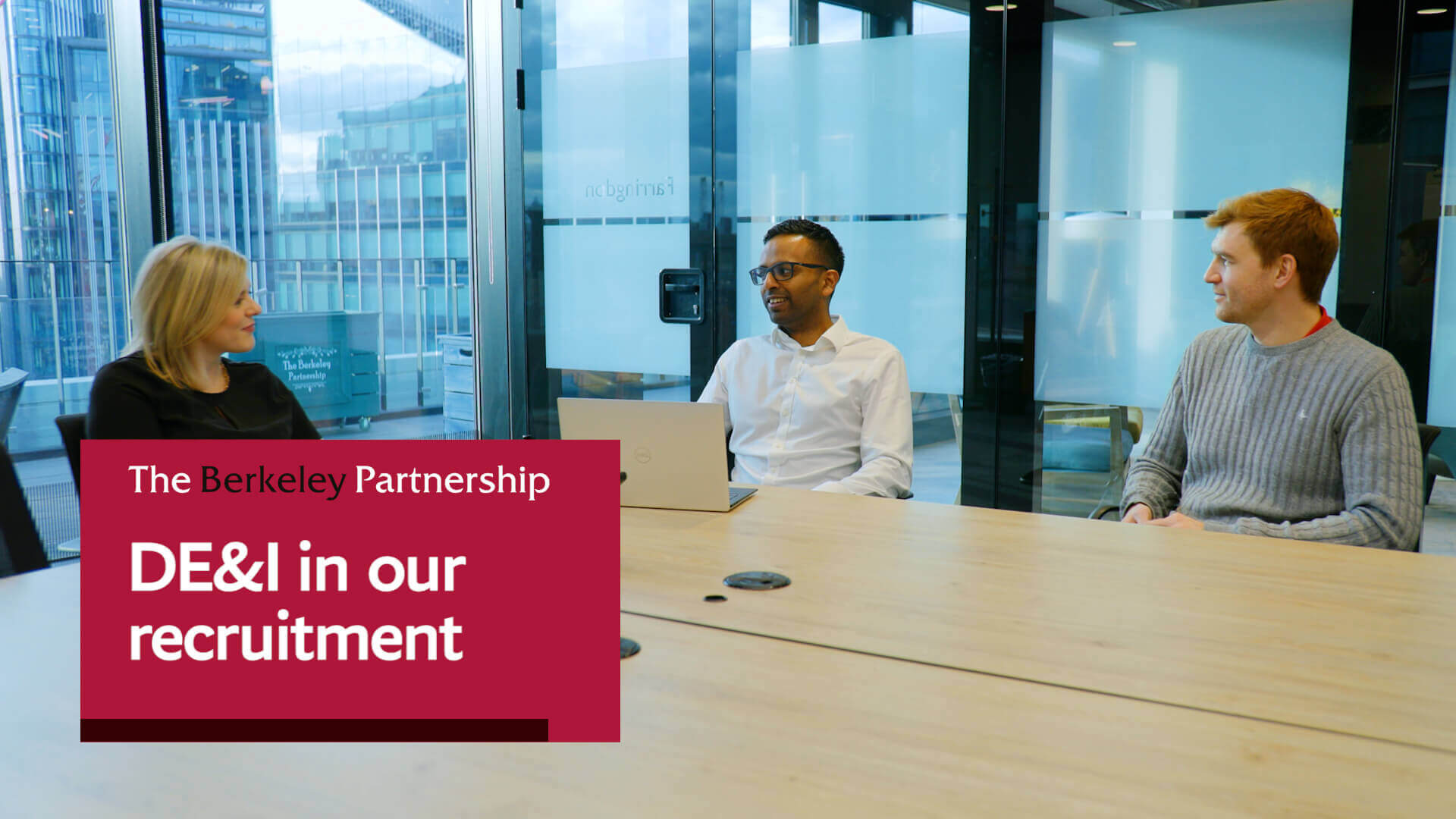
View Transcript
Katharine Brecknell:
We really care about attracting diverse talent, so we need to make sure this topic is at the forefront of our minds. And we need to make sure that we do that as firm, as Berkeley, but also as a community.
Over the last four years, Berkeley has consistently hired a more diverse talent pool than the management consulting industry standard. Our talent pool at intake now is 50:50 on gender and 70%, white 30% non-white on ethnicity. We're obviously proud of this, but we have ambitions to go even further.
We've always been very open about the makeup of the firm both internally and externally. And this is great because we can see the progress we're making, whilst also signalling how seriously we take this challenge. It's important to us that our recruitment process is consistent, transparent and equitable. So, we have put a few things in place to make sure that that's the case.
We have a multistage interview process with different interviewers and partners at every stage. So that we can hold each other to account. Mostly it's our partners interviewing at Berkeley, so giving them the right training around things like biases is also important.
Data gathering is also a key priority for us. We want to be able to track individuals from different diverse backgrounds at every stage of the process so we can see how they do. This has shown us some interesting statistics as well. For example, although fewer women enter our process, they are more likely to receive an offer from us. We also use robust psychometrics as another data point. So, with all these data points together, all in all, it's a very evidence based and fair process.
When making the final decision, multiple people are involved we have partners but also myself as the recruitment professional bringing that unbiased and balanced voice. Berkeley is a family-friendly place. And we want to give people the opportunities to work on roles that give them lots of flexibility. And we can also offer part time. We want to offer all our consultants exciting and challenging careers and projects to work on. But whilst also giving them the support and flexibility so that they don't have to sacrifice their home life.
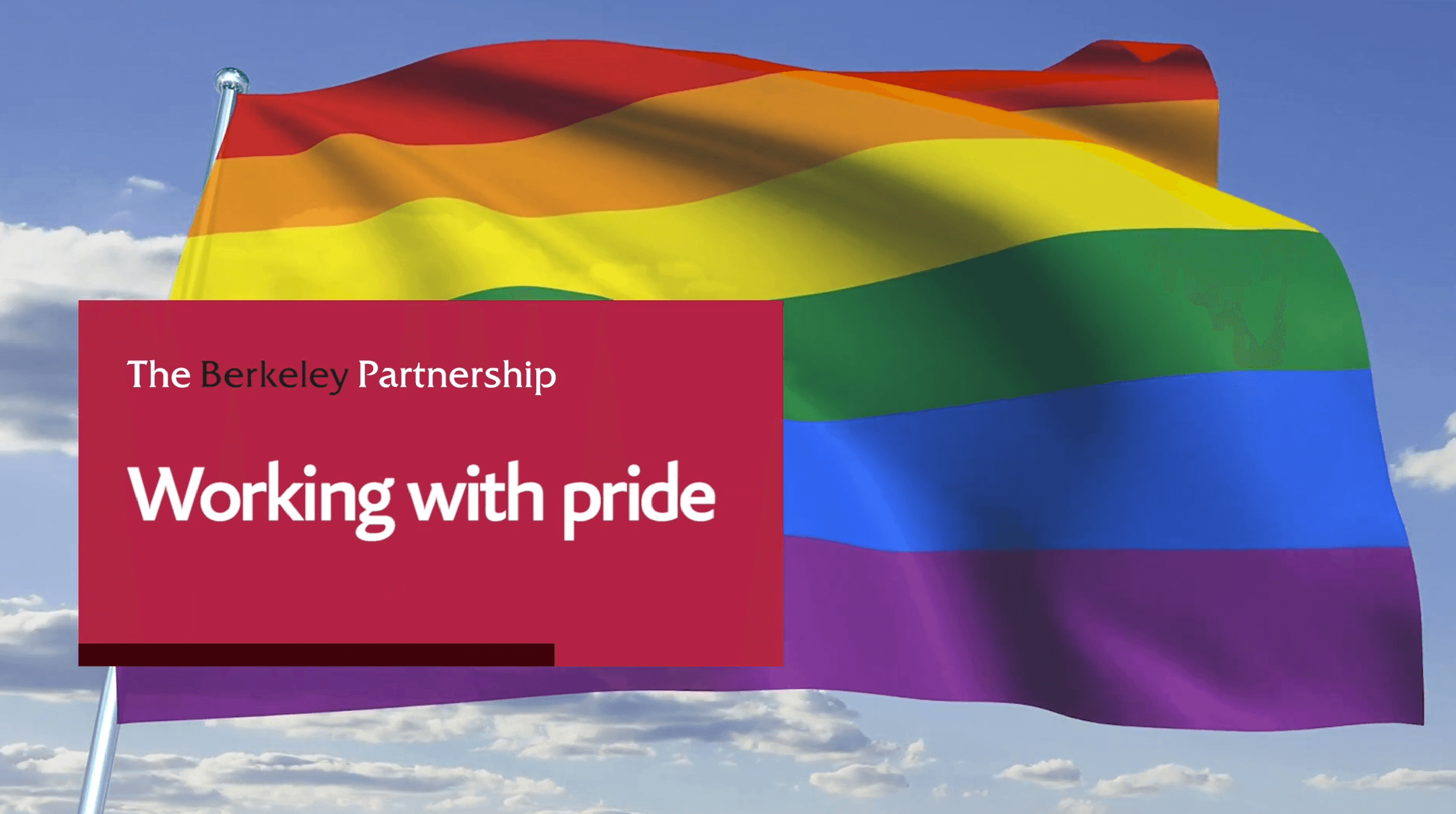
View Transcript
Dave Edwards:
One of the things that I've always thought about is every time I started at a new job, I have to come out again. It's not this thing that happens once and you never do again. It's still difficult to do sometimes depending on where you work and who you work with. And when I came to Berkeley that wasn't a challenge for me. It was very inclusive and a safe space. But I want that to be everyone's perspective, any organisation anywhere where people have to invest part of themselves. I want that to be a safe space for them to give themselves into.
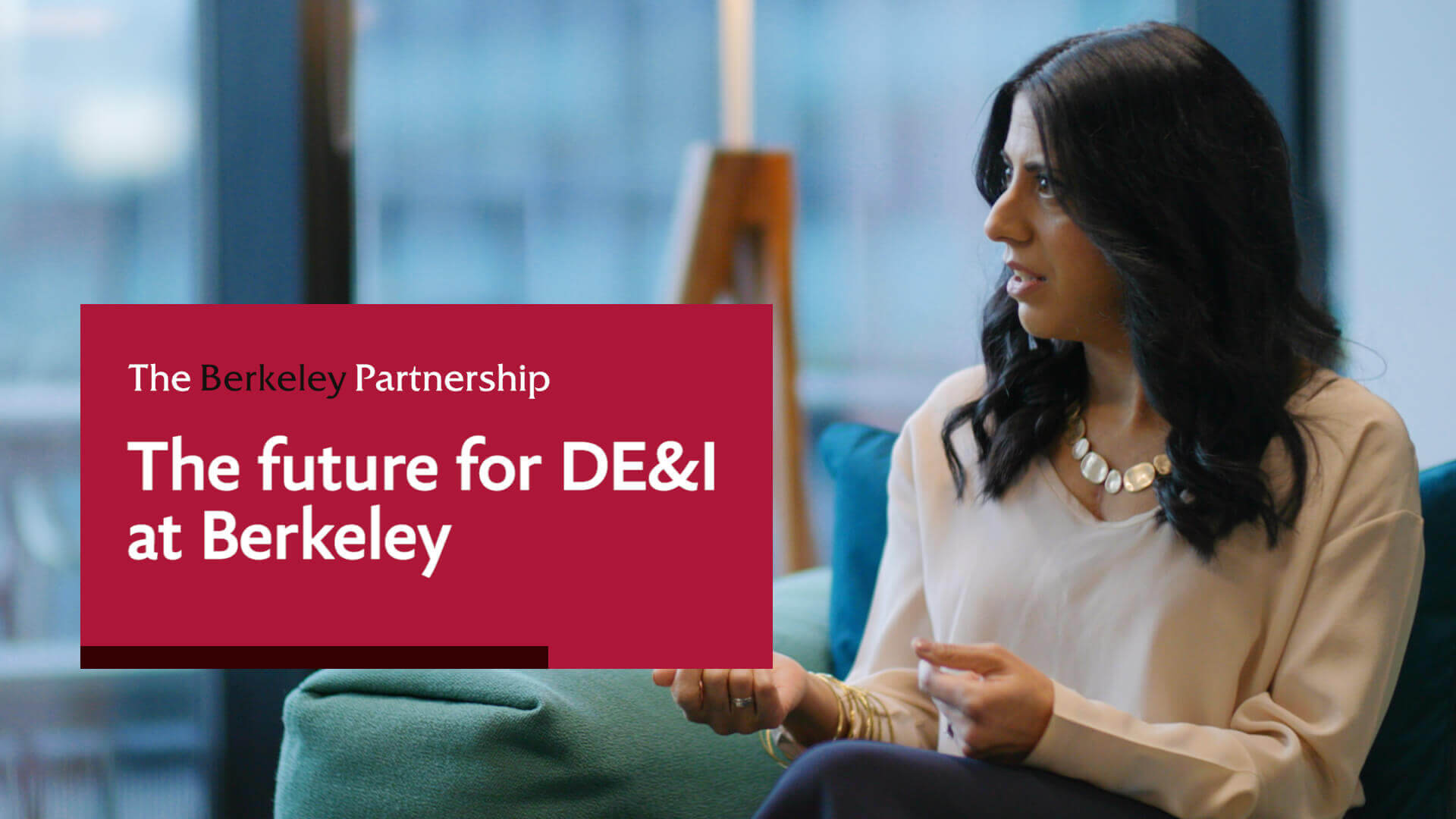
View Transcript
Sameera Simjee:
I’m Sameera Simjee and I'm partner at Berkeley. And like all our partners, I joined the firm as a consultant. So, retention is a key part of our strategy. To retain diverse talent, we really need to build equality and inclusive spaces to lean in and really listen, and to ensure that we are creating equitable processes for all our people.
But as the first non-white working parent in the partner group, we absolutely need to accelerate on our strategy to ensure that diverse leadership is absolutely the norm and not the exception. It's my personal agenda to ensure that our structures, our teams and the conversations that we're having positively move the dial.
We established our women at Berkeley network to offer a sense of community for our women, but it's open to all genders, because to move all women forward, that must be supported by men, through understanding through education and through ally ship. That's just one example of the evolution of our group and the focus of our leadership team.
Being a partner in this firm feels completely natural and that's down to Berkeley’s core values, of doing the right thing, of rigor, of simplicity, and fundamentally of fairness. By harnessing those values we're providing a really strong foundation for our DE&I journey. I'm hugely excited to be welcoming the next cohort of individuals into our Partner Group. And that would be a cohort who are fundamentally more diverse and bring a rich tapestry to how we lead and run our firm in the future.
Katharine Bracknell:
We really care about attracting diverse talent. So, we need to make sure this topic is at the forefront of our minds. We need to make sure that we do that as a firm, as Berkeley, but also as a community.
Kali Crow:
Before there was interest, but it was very much about doing some training. But now there is real energy and enthusiasm and thoughtfulness for being educated in this space. And that's enabled us to really broaden the curriculum and have better conversations.
Pankaj Bansal:
Every time we achieve a goal, we just move the goalposts a bit farther out. So, for us, it's not a race from the start point to the finishing point. But for us, it's an iterative process where we just keep getting better and better.
Will Rivers:
I've been with Berkeley for nearly 15 years now. Over the last five years I’ve really seen the makeup of the firm change and I've really enjoyed being part of a diverse team working with different genders, different ethnicities, different sexualities.
I've seen first-hand how we're better at our client work and better as a business and just a more interesting collective to be a part of. But at the same time, I hadn't appreciated it would take a conscious effort to get that diverse group and ensure everyone is feeling really included in that progression and development is all equal.
You just assume that it would happen naturally and affirm full of well-meaning and intelligent people, but it requires thought, and it requires discussion. There are complex factors here. Some behaviours do need to be adapted. I have a role to play, obviously as a leader in the firm, but perhaps more importantly, as one of the majority groups.
I need to educate myself. I need to listen to people's experiences. I need to engage in the conversation and only through doing so I realised that my professional and personal experiences have been quite different to those of others. My personal goal is to keep bringing more diversity in to help it flourish and just enjoy the journey as we go. When I look to the future, I'm genuinely excited. I'm excited about what the partner group will look like and feel like I'm excited about what the whole firm will look like and feel like.
Our diversity, equity and inclusion in focus

Sameera Simjee:
Hi, I'm Sameera and this is Will. We are two of the partners at The Berkeley Partnership. Berkeley is a consultancy which specialises in transformation and strategy, and we're joined today by Dan from Vercida.
Dan Robertson:
Hi, good to see you both again. You know, we at Vercida have been working with you for a while now on your Diversity Equity and Inclusion strategy. Talk to us about your ambition: how did you get started?
Sameera Simjee:
The big ambition here, Dan, for us as an organisation is to be recognised as a firm which attracts, develops and retains diverse talent. And with that, diversity is really harnessed and valued, that's important to us.
Dan Robertson:
Right and I know you've got a great roadmap and Will, you've got your diversity, equity and inclusion strategy and underpinning the strategy you've got these six strategic goals.
Will Rivers:
One of those goals is focused on continuing to increase the diversity of talent in our consulting group and our business services group. So, it really represents the recruitment pool. A follow-on goal from that is going to ensure that diverse talent progresses in the firm and into the partner group. And if we've got this diverse team, we know we must continue to foster an inclusive workplace. To us, that means ways of working, culture, where people can engage, thrive, opportunities are equitable, and everyone can just bring their whole self to work.
Sameera Simjee:
That firm engagement is so important. One of the things that we've done is established a DE&I working group.
Mike Abbott:
So, we meet fortnightly to hold ourselves to account against the strategic objectives and the actions that we set out in the DE&I strategy last year.
Dave Edwards:
So we've been going through a journey to gather information on people, both in terms of how they feel within Berkeley and in terms of their views on our DE&I agenda, their views on whether they feel included, whether they, you know, what they want to see more of so that we just have a much better understanding of what’s working for us, and where we still have to focus and improve upon.
Mike Abbott:
We also talk about hot topics and are constantly looking for external events that are DE&I related that we might have a point of view on or that we can take action to support.
Will Rivers:
So, we have a focused DE&I leadership role in our group, I'm currently fulfilling that role. And the purpose of that role is quite simple. It is to own the DE&I strategy on behalf of the rest of the team, and to effectively hold us all to account to make sure we make progress.
Kali Crow:
Having a dedicated DE&I leader has really made a difference. It's moved the conversation on so that it is much broader and has much more momentum, energy and focus, which has really enabled us to push things forward.
Dan Robertson:
Talk to us about how you started and why did you start? What was the driver for you?
Sameera Simjee:
We started because ultimately focusing in on this space is just the right thing to do. It's right from a wider society perspective, and it's right for our people and our people are front and centre of everything that we do in our strategy. If I reflect on where we are, our consulting group and our business services team are more diverse than they have been. We're very aware that we have a gap between the diversity of our wider firm and the diversity of our leadership team and that's something that we're absolutely committed in leading into. Our business model is a very organic one. We make partners from within the firm and that is a very deliberate strategy. We do that to really maximise our consultants' opportunities for career development. But on the flip side, that does mean it will take us time to change. But we absolutely understand the benefit and the value of having a more diverse team and a leadership team who reflects the wider group. So, I, Will and the wider leadership team are absolutely committed to making that change.
Dan Robertson:
I think that's a big challenge we see with a lot of professional services firms around holding on to diverse talent then moving on them onto partnership.
Anne-Lise Antolinos:
I've been exposed to prejudice based on my gender and being a mother, in the past 10 years. So, I think it's important that we change the game and I know it's changing but I want to be part of that change. I also have two children with special needs and for me, I'm a bit worried about their future. So, I really want to make sure that there's a place for people with special needs as well, not just about changing gender and colour.
Sameera Simjee:
Can you tell us a little bit about the challenges and maybe some of the trends in DE&I moment?
Dan Robertson:
We see lots of trends, particularly from professional services and beyond. I mean, one of the big things is around data. So really getting a handle on how well you are doing around the diversity aspect. How well are you doing around the inclusion aspect? The other trends that we see are around making sure that you have a strategy which responds to talent. But I think the final one is around clients, and I hear a lot from our clients around the pressure to have diversity equity inclusion central to what they do. I'm curious about your clients, is it on their radar how'd you have conversations with them, etc?
Sameera Simjee:
They absolutely see the benefit of working with diverse teams. And so, reflecting on Berkeley's strategy in this space. We want to foster that inclusion and the diversity of thought, the diversity of approach in our teams, because we know that that brings richness and depth to our work and the way in which we work with our clients. That's important to us. But also, it's been a learning process as well. We've learned a lot about our own approach from the conversations that we're having with our clients. At the end of the day, we are all about our people. That is our core business. So really focused on goals and focusing on the measurements is how we're going to move ourselves forward.
Dan Robertson:
Brilliant, thank you.

Sameera Simjee:
Hi, I'm Sameera and this is Will. We're two of the partners at The Berkeley Partnership, and we're joined by Dan from Vercida.
Dan Robertson:
Hi, good to see you both. You know that at Vercida when we are working with our global clients, particularly when we are developing diversity equity inclusion strategies. The first thing that we always talk to them about is leadership. I suppose we've got to engage everyone else beyond the partnership. So, what else have you been doing beyond that level of engagement?
Will Rivers:
We sort of built into the fabric of the firm, just a regular heartbeat of talking about DE&I. We do that we have Slack channels. We have our monthly meetings; we have DGs (discussion groups) on various topics. And we just keep the conversation going recognising events and dates, and we found that it's been great to raise awareness and educate each other.
Sameera Simjee:
We're also developing a network of advocates as well. And again, the purpose of that group is to really support everyone across the firm, so they feel comfortable in playing their individual parts in this journey.
Dave Edwards:
I think the thing that we've done so far that's sort of had both the biggest impact and that I'm most proud of is getting people to take personal accountability for our DE&I agenda. And that's happened, because we've had the strategy, we've launched the strategy and we've consulted people on the strategy. It happened because we're more equipped and able to talk about issues. We can spot and talk about where things are and aren't working. And more than ever, it just feels like people have got a real stake in what we're trying to achieve. They're asking how can I help more? What do you need me to do? And I think that it's not to say no one's never done it but it's something that everyone wants to know now. I think that's a real sort of key turning point for Berkeley and our DE&I agenda.
Dan Robertson:
Some great stuff there about the structure and building capacity of all colleagues to engage in this topic. What else have you been doing, just give me a sense of other activities?
Sameera Simjee:
This is an area that Vercida have really helped us with developing our conscious inclusion training, which again is open to everyone across the firm, and is now a core part of our curriculum in this space. And that has really been to bring everyone up to a level set in terms of being aware of some of these rich DE&I topics.
Will Rivers:
We also have inclusive leadership education for us as a partner group, but we do that across the firm because our consultants and business services, we have leaders everywhere. So, we built out that training curriculum. We have been reviewing our recruitment approaches and our career progression at Berkeley approaches to make sure that they are free from unconscious bias. Those opportunities are equal or equitable. And we've done that, and we will do that periodically. We spent quite a lot of time at the firm talking about partner potential. So, we put in place the opportunity for real clear explanation of our partner making process and what how we assess partner potential and the reason we've been doing that is to signal to all our talents that they could become a partner even if they can't see themselves in the partner group today.
Sameera Simjee:
It's really important.
Dan Robertson:
I’m curious about how you track progress but also what sorts of measurements you’ve put into place to know whether you're winning or not.
Will Rivers:
With Vercida’s guidance, we do track progress. We know that data is important for us to know that we're progressing to our ambition and the goals that we set ourselves. There are two types of data that we track. First of all, data about diversity, makeup of consultants, makeup of Business Services group and makeup of our partner group and all aspects of diversity. So we capture data about that, and we monitor the trend. Then the second aspect is more about inclusion. And of course, that's more sentiment based. So, we do and will continue to do, periodically, a sentiment survey as a whole firm. It's a set of questions that enable us to gauge how people feel about our progress, how people feel about the journey that we're doing. And those two data points are massively important for us to know that we're going in the right direction.
Kali Crow:
We've been constantly focusing on all elements of our development process to ensure that they are equitable for everybody, providing a range of different options and learning when necessary.
Dave Edwards:
Wherever there's a challenge. It's about ‘what can we do to fix this? How do we fix it faster? And where do we need to look next?’
Dan Robertson:
Will, we've talked quite a lot about what you've been doing internally. Let's flip it over and talk about externally What have you been doing in that space?
Will Rivers:
Well, as we build our understanding, and as we educate ourselves, we are finding our voice and that means that we're able to communicate more externally to and that's important because we want people to know what Berkeley stands for and our people stand for
Dan Robertson:
Great and Sameera to you, we know that professional service companies use the skills of their talent to promote diversity and equity inclusion in the community. Just give us a sense of again, of what Berkeley is doing in that space.
Sameera Simjee:
We've been using our professional skills in both London and New York to support some amazing not for profit initiatives. So, we're working to tackle inequality in their communities. We have got such a talented pool of individuals at Berkeley so it's great that we can really harness those professional skills to contribute in such a positive way to these organisations. And really, it's a win-win because it's so rich and rewarding for our people as well.
Jenna Goldstein:
So, we've been able to extend what we do here as part of our positive social action and provide some charity work for a young person's organisation. Now typically here at Berkeley we do a lot of pro-bono work helping charities and organisations with an operating model or their strategy which is something that we specialise in. We wanted to be a bit more diverse and inclusive for our firm and make sure that everybody can participate and give back to the local community. So, we've had some sessions with this charity, providing some mock interview experience for the young people going into the world of work.
Sandy Kyin:
I wanted to get involved with the Robin Hood programme because I felt like it is important to give back to the community. They do that through an executive coaching programme, where they provide coaches or consultants that they partner with as executive coaches to support their non-profit leaders.
Will Rivers:
So we know we can make a real difference at Berkeley internally, yes, but also externally through the things that we say and the things that we communicate, but the things that we also do like Sam described earlier.
Dan Robertson:
Great talking to you, as always.

Sameera Simjee:
Hi, I'm Sameera and this is Will. We're two of the partners at The Berkeley Partnership. And we're joined by Dan from the Vercida.
Dan Robertson:
Hi, good to see you again Sam and good to see you Will.
Sameera Simjee:
We've really appreciated the expertise that you've brought to this space. Can you tell us a little bit about the challenges and maybe some of the trends in DE&I moment?
Dan Robertson:
So, one of the biggest trends that I see is a real focus on this idea of equity. We've historically talked about diversity and what that means is really a conversation about representation. How do we get diverse talent in organisations and how do we move it up?
I think now the shift is about saying when we have diverse talent in how we look after them, how do we make sure that we are making decisions based on those principles of fairness, mitigating bias. So, a real focus on equity is a big shift in that focus on belonging. So that's one of the big trends I see.
Then I think aligned to that is that trend on is kind of connected to talent, but it's more about an expectation from diverse talent. So, you know, people talk about employee activism, and we see lots of employees out there that are kind of demanding from their employers, a roadmap or a direction of travel on diversity, equity inclusion. So those two things I think are quite interesting, I think for all employers, those will be ramped up.
Richard Pawson:
Berkeley has got a strong commitments DE&I. We've invested loads in it. We communicate. We’re proud of it as a firm. We talk about it. It's starting to run through everything that we do. Management consultancy does face a real challenge in this area. It's not going to respond to the issues that have been highlighted by slowly evolving and trying to maintain and keep the previous structure. It is a different approach that's needed, and that's the direction we're setting out on.
Dan Robertson:
I think the other thing which I've been reflecting on recently, is that we've seen some real movement in this area is around regulatory requirements. So, you know, in the US where you operate and here in the UK regulators from different sectors putting much more pressure on thirds, which will have a ripple effect on Berkeley in terms of essentially around accountability. So, what are you doing around DE&I and how do you put yourself publicly accountable to that
Will Rivers:
We don't want to wait for regulation to be to be put upon us. We just want to do the right thing. An example would be pay gap reporting. So, for a long period of time, we've been doing gender pay gap reporting. There is no legal need for us to do ethnicity pay gap reporting, but that's something that we want to do as well.
Dan Robertson:
It is interesting reflecting on the pandemic, around how there's a need to promote fairness in outcomes. And one of the big trends that we're seeing now is this: people are talking about flexible, agile working and how we, you know, flex those up.
Sameera Simjee:
Honestly, flexible working is not a new thing for us at Berkeley. We've always been doing that because we very much work in the way that our clients work. Sometimes that means being on site, sometimes that means being remote, or hybrid of that. Because for us as well, it's about connecting. So, we don't want to lose that connective tissue that we have with our people. So, one of the things that we are doing is finding different ways that we can make those connections real, regardless of whether they're in person or whether they're virtual over a zoom, for example.
Anne-Lise Antolinos:
I've always worked flexibly at Berkeley. As a working mother, I've been working four days a week since I joined. I feel that it's very important to help improve diversity, particularly when we're thinking about working parents and working mothers, especially when we have children at a young age. It's important for us to be able to have that flexibility and to and to feel that it's okay to be flexible.
Dan Robertson:
Most organisations out there now are working around that principle of ‘what gets measured gets done’, and that means target, read around having diverse talent in and moving diverse talent up the organisation. So, I just want to get your thoughts on where bulk is at in terms of target setting and your thinking is around that.
Will Rivers:
We have very, very clear goals and we've been very clear how we want to measure those goals. And that's all written down and agreed within our DE&I strategy. We know where we want to get to. We are clear on what that means in terms of measurement. And we'll just keep an eye on those trends right the way through.
Sameera Simjee:
So much of this agenda is about doing the right thing for our people. And we know we're on a journey and those measures and those metrics and certainly those goals will help us to achieve them.
Dan Robertson:
Thank you both very much.

Katharine Brecknell:
We really care about attracting diverse talent, so we need to make sure this topic is at the forefront of our minds. And we need to make sure that we do that as firm, as Berkeley, but also as a community.
Over the last four years, Berkeley has consistently hired a more diverse talent pool than the management consulting industry standard. Our talent pool at intake now is 50:50 on gender and 70%, white 30% non-white on ethnicity. We're obviously proud of this, but we have ambitions to go even further.
We've always been very open about the makeup of the firm both internally and externally. And this is great because we can see the progress we're making, whilst also signalling how seriously we take this challenge. It's important to us that our recruitment process is consistent, transparent and equitable. So, we have put a few things in place to make sure that that's the case.
We have a multistage interview process with different interviewers and partners at every stage. So that we can hold each other to account. Mostly it's our partners interviewing at Berkeley, so giving them the right training around things like biases is also important.
Data gathering is also a key priority for us. We want to be able to track individuals from different diverse backgrounds at every stage of the process so we can see how they do. This has shown us some interesting statistics as well. For example, although fewer women enter our process, they are more likely to receive an offer from us. We also use robust psychometrics as another data point. So, with all these data points together, all in all, it's a very evidence based and fair process.
When making the final decision, multiple people are involved we have partners but also myself as the recruitment professional bringing that unbiased and balanced voice. Berkeley is a family-friendly place. And we want to give people the opportunities to work on roles that give them lots of flexibility. And we can also offer part time. We want to offer all our consultants exciting and challenging careers and projects to work on. But whilst also giving them the support and flexibility so that they don't have to sacrifice their home life.

Dave Edwards:
One of the things that I've always thought about is every time I started at a new job, I have to come out again. It's not this thing that happens once and you never do again. It's still difficult to do sometimes depending on where you work and who you work with. And when I came to Berkeley that wasn't a challenge for me. It was very inclusive and a safe space. But I want that to be everyone's perspective, any organisation anywhere where people have to invest part of themselves. I want that to be a safe space for them to give themselves into.

Sameera Simjee:
I’m Sameera Simjee and I'm partner at Berkeley. And like all our partners, I joined the firm as a consultant. So, retention is a key part of our strategy. To retain diverse talent, we really need to build equality and inclusive spaces to lean in and really listen, and to ensure that we are creating equitable processes for all our people.
But as the first non-white working parent in the partner group, we absolutely need to accelerate on our strategy to ensure that diverse leadership is absolutely the norm and not the exception. It's my personal agenda to ensure that our structures, our teams and the conversations that we're having positively move the dial.
We established our women at Berkeley network to offer a sense of community for our women, but it's open to all genders, because to move all women forward, that must be supported by men, through understanding through education and through ally ship. That's just one example of the evolution of our group and the focus of our leadership team.
Being a partner in this firm feels completely natural and that's down to Berkeley’s core values, of doing the right thing, of rigor, of simplicity, and fundamentally of fairness. By harnessing those values we're providing a really strong foundation for our DE&I journey. I'm hugely excited to be welcoming the next cohort of individuals into our Partner Group. And that would be a cohort who are fundamentally more diverse and bring a rich tapestry to how we lead and run our firm in the future.
Katharine Bracknell:
We really care about attracting diverse talent. So, we need to make sure this topic is at the forefront of our minds. We need to make sure that we do that as a firm, as Berkeley, but also as a community.
Kali Crow:
Before there was interest, but it was very much about doing some training. But now there is real energy and enthusiasm and thoughtfulness for being educated in this space. And that's enabled us to really broaden the curriculum and have better conversations.
Pankaj Bansal:
Every time we achieve a goal, we just move the goalposts a bit farther out. So, for us, it's not a race from the start point to the finishing point. But for us, it's an iterative process where we just keep getting better and better.
Will Rivers:
I've been with Berkeley for nearly 15 years now. Over the last five years I’ve really seen the makeup of the firm change and I've really enjoyed being part of a diverse team working with different genders, different ethnicities, different sexualities.
I've seen first-hand how we're better at our client work and better as a business and just a more interesting collective to be a part of. But at the same time, I hadn't appreciated it would take a conscious effort to get that diverse group and ensure everyone is feeling really included in that progression and development is all equal.
You just assume that it would happen naturally and affirm full of well-meaning and intelligent people, but it requires thought, and it requires discussion. There are complex factors here. Some behaviours do need to be adapted. I have a role to play, obviously as a leader in the firm, but perhaps more importantly, as one of the majority groups.
I need to educate myself. I need to listen to people's experiences. I need to engage in the conversation and only through doing so I realised that my professional and personal experiences have been quite different to those of others. My personal goal is to keep bringing more diversity in to help it flourish and just enjoy the journey as we go. When I look to the future, I'm genuinely excited. I'm excited about what the partner group will look like and feel like I'm excited about what the whole firm will look like and feel like.

The Women@Berkeley Network
The Women@Berkeley Network plays a key role in helping the Berkeley Partnership to achieve its DE&I ambitions as a firm. The initiative is focused on fostering a truly inclusive workplace, where all women can achieve to their full potential.

Our culture
The Berkeley Partnership’s unique culture ensures we are by our clients’ side when it matters most. Our shared values provide us all with a sense of purpose and belonging – so we can both fulfil our promise to clients and support each other too.
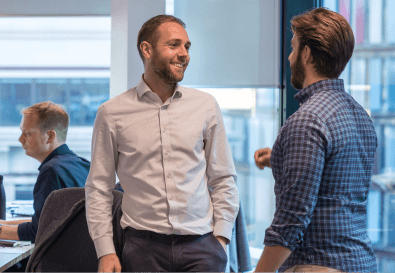
Corporate responsibility
Our people have interests and causes they want to support beyond their day-to-day work, so we make every effort to help them achieve this.









